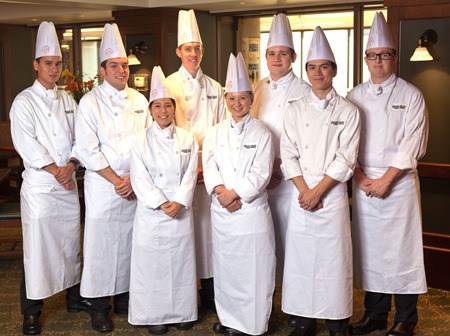Downstairs at Vancouver Community Colleges Pender Street campus, the nine members of Canadas Junior Culinary Team are quietly buzzing around one of the schools vast prep kitchens, kneading dough, piping meringue, whisking bright-coloured sauces. Theyre getting ready to move to a kitchen upstairs, where they will practise cooking and plating the two dishes they will be presenting at the World Culinary Olympics in Erfurt, Germany this October. Theyre representing Canada against 27 other nations and they want to win gold.
We definitely have gold on the brain every time we come [to practise], says Jasper Cruickshank, his head tucked over a cutting board. He and team leader Tyson Gee are the two veteran members of the team. For the rest, this will be their first time at a high-level culinary competition (think 85 portions of two dishes, plated under a time constraint, with judges in your face asking you to explain your every move). The competition is still a while off, but preparations have been underway since early last year fundraisers, lower-level competitions, and practice dinners, like these. The team, made up of seven boys and two girls, has plans for a cross-Canada tour, as well as a competition in Korea at the end of April, to help the unit hone their skills, and their nerves.
John Carlo Felicella, department head of VCCs culinary arts program, is also team manager of the junior team. Hes been involved with the colleges culinary competition program since 1986. Lots of students want to be on the team, he says. But after the first experience, most bail out.
Competing isnt for everyone, he says. Canadas considered a powerhouse on the culinary circuit, so the pressure to win is high. Most members work full-time, go to school full-time or do a bit of both on top of their team obligations. They have to be willing to give up many hours from their personal life, be in the kitchen for long hours, and come in on Sunday mornings good practice for the life of a chef, he jokes.
The group is young the youngest is 18 and the eldest, self-described mother hen Daniel Davyduke, is 26 but professional, taking notes and offering each other advice. Davyduke is too old to actually compete (the cutoff for the juniors is 25), so he acts as a support member and social media manager (the team even has a YouTube channel). Theyre passionate about cooking Davyduke wears a wedding ring because he is married to his profession and many have practising their craft since they were mid-teens.
I was 16, says Davyduke. A potwash at the Pantry. He worked in restaurants across the Lower Mainland until landing at VCC when he was 21. Eventually, he hopes to teach. One day, he says. Give where you live, you know?
Supporting young chefs like these is crucial in order to show young people that the culinary arts is a viable vocation, says Arlene Keis of Go2, a human resources company that works to promote and support the industries of BCs tourism sector. Her groups labour market research indicates that the demand for new chefs in Metro Vancouver is only going to rise in the coming years. Approximately 1,700 spaces will need filling by 2020. Were trying to grow our culinary tourism in BC, so increasing the quality and the training of people, and the attraction to the profession is really important, she says.
Felicello says the problem isnt enticing young chefs into the profession (VCCs program has a wait-list of 17 months), its keeping them in it. Most leave after two years to pursue other endeavours. Its a tough industry. You have to love it, he says, looking around the room. But theres not one person here who wont achieve something big or at the very least find happiness in the profession.



